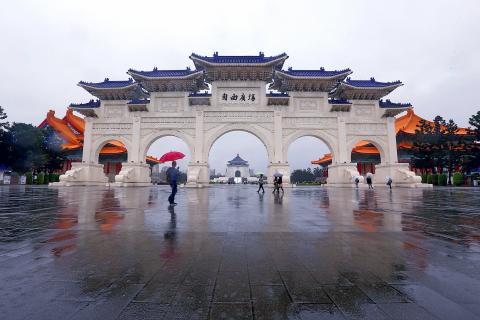President Tsai Ing-wen (蔡英文) yesterday announced the declassification of all historical records relating to the 228 Incident, saying that the measure is critical to establishing the truth and expediting transitional justice.
“Pushing for transitional justice is one of the most important missions for Taiwan’s democracy, but we often have to discern the truth from the mists, with the most crucial yet complicated task being uncovering and collecting the relevant documents, which are scattered across various government agencies,” Tsai said on Facebook.
Tsai’s Facebook post came after the government released a press release touting similar moves, in which it said the speedy declassification of confidential files was aimed at meeting the public’s expectation of transitional justice.

Photo: CNA
Tsai said collecting such material is also fundamental to the government’s efforts to compile a report on transitional justice, “as many traces of history can be found in past government documents, which reveal the names of the people involved, related incidents or other key elements.”
Of the National Achieves Administration’s documents relating to the 228 Incident — which total 1.37 million pages — 4,617 documents were classified, but they have all now been declassified in their entirety, Tsai said.
“In addition, the related political files containing a total of 990,000 pages from 83 different government divisions were listed as pending transfer [to the administration]. The transfer process is expected to be completed by the end of June,” Tsai said.
The Cabinet plans to allocate additional funds to the National Archives Administration to facilitate a three-year-long investigation and collection of political materials relating to the 228 Incident and the Period of National Mobilization for Suppression of the Communist Rebellion, which is to begin on March 1, Tsai said.
“That will provide the foundation for the writing of our investigative report on transitional justice,” she said.
The 228 Incident refers to a crackdown launched by the then-Chinese Nationalist Party (KMT) regime against civilian demonstrations following an incident in Taipei on Feb. 27, 1947. The event marked the beginning of the White Terror era, during which thousands of Taiwanese were arrested, imprisoned and executed. Historians estimate as many as 30,000 people were killed.
Presidential Office spokesman Alex Huang (黃重諺) said the latest development, goals and purposes of the government’s transitional justice commitment are expected to be the focal points of Tsai’s first speech on the 228 Incident as president.
“Pushing for transitional justice is a necessary process for any democratic nation undergoing a transition from authoritarian rule… It is the government’s responsibility to deal with illegitimate party assets, uncover the truth about human rights violations and problematic policies enacted during the rule of the authoritarian regime, and to restore people’s rights,” Huang said.
The transitional justice bill and the political archives bill have been listed as the Democratic Progressive Party caucus’ priorites in the current legislative session, Huang said.
After the passage of the bills into law, an investigative report on the White Terror era is to be published and a truth and reconciliation commission established, Huang said.

NATIONAL SECURITY THREAT: An official said that Guan Guan’s comments had gone beyond the threshold of free speech, as she advocated for the destruction of the ROC China-born media influencer Guan Guan’s (關關) residency permit has been revoked for repeatedly posting pro-China content that threatens national security, the National Immigration Agency said yesterday. Guan Guan has said many controversial things in her videos posted to Douyin (抖音), including “the red flag will soon be painted all over Taiwan” and “Taiwan is an inseparable part of China,” while expressing hope for expedited “reunification.” The agency received multiple reports alleging that Guan Guan had advocated for armed reunification last year. After investigating, the agency last month issued a notice requiring her to appear and account for her actions. Guan Guan appeared as required,

A strong cold air mass is expected to arrive tonight, bringing a change in weather and a drop in temperature, the Central Weather Administration (CWA) said. The coldest time would be early on Thursday morning, with temperatures in some areas dipping as low as 8°C, it said. Daytime highs yesterday were 22°C to 24°C in northern and eastern Taiwan, and about 25°C to 28°C in the central and southern regions, it said. However, nighttime lows would dip to about 15°C to 16°C in central and northern Taiwan as well as the northeast, and 17°C to 19°C elsewhere, it said. Tropical Storm Nokaen, currently

‘NATO-PLUS’: ‘Our strategic partners in the Indo-Pacific are facing increasing aggression by the Chinese Communist Party,’ US Representative Rob Wittman said The US House of Representatives on Monday released its version of the Consolidated Appropriations Act, which includes US$1.15 billion to support security cooperation with Taiwan. The omnibus act, covering US$1.2 trillion of spending, allocates US$1 billion for the Taiwan Security Cooperation Initiative, as well as US$150 million for the replacement of defense articles and reimbursement of defense services provided to Taiwan. The fund allocations were based on the US National Defense Authorization Act for fiscal 2026 that was passed by the US Congress last month and authorized up to US$1 billion to the US Defense Security Cooperation Agency in support of the

PAPERS, PLEASE: The gang exploited the high value of the passports, selling them at inflated prices to Chinese buyers, who would treat them as ‘invisibility cloaks’ The Yilan District Court has handed four members of a syndicate prison terms ranging from one year and two months to two years and two months for their involvement in a scheme to purchase Taiwanese passports and resell them abroad at a massive markup. A Chinese human smuggling syndicate purchased Taiwanese passports through local criminal networks, exploiting the passports’ visa-free travel privileges to turn a profit of more than 20 times the original price, the court said. Such criminal organizations enable people to impersonate Taiwanese when entering and exiting Taiwan and other countries, undermining social order and the credibility of the nation’s